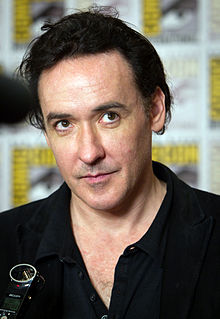So it walked and quacked just like a journalistic story. But they're not willing to call him a journalist.
John Cusack: And so therefore, he has no protections?
Jonathan Turley: Well, that's how the US government is dealing with it. They have rather transparently opted to deal with him as a suspected hacker. And they're going to pursue him on that ground. If they get their hands on him, I expect they're going to do everything they can to keep him in jail. They need to hoist the wretch, they need to make it clear that you won't get away with this if you embarrass the government and release this type of information. Both the Bush and Obama Administration have previously threatened journalists. They are not going to hold back on Assange if they have already threatened to prosecute reporters.
John Cusack: As the man once said -- You have the right to free speech -- as long as you're not dumb enough to actually try it. So it's another part of the widening clamp-down on civil liberties and freedom of speech.
Jonathan Turley: Indeed.
So the Justice Department continues to insist that journalists and others who receive classified information are technically violating the law if they know that they are in possession of classified information and release it. This is an age-old argument that we've seen since Nixon. There's a continuing hostility towards journalists doing this type of act. I think that's what makes Assange such a tempting target for the government. Because they know they can pursue him and that the media is equivocating as to whether to support him, or even whether to explain him to the public.
I mean, the astonishing thing is that after all this time, Assange remains as much of a mystery as he was in the first month. The question is why. And the media really is treating him the way the government is. He's not a journalist, he's not a whistleblower; he's an Assange. He's becoming a noun unto himself.
John Cusack: Yeah, that's true.
Kevin McCabe: He's not one of them.
Let me ask you a question -- from a legal point of view, the fact that the government can take a very strict and a very calculated, and almost singular, approach to leaks, and individuals who do the leaking; yet for their own political purposes have [routinized] leaking to outlets that they favor, in order to control the message in politics?
Jonathan Turley: You're right, that's always been that hypocrisy --
John Cusack: And then the other hustle -- the grand diversion we do. We start to leak personal peccadilloes and/or personality profiles that make us either like or despise a person, and we never know what's actually true-- Assange is vain, he's messianic, a sexual predator etc etc -- none of us know whether it's true or not; We have no idea.
Jonathan Turley: Right.
John Cusack: But the argument then pivots to the, perhaps, feigned personality disorders of the individual, not to the principle behind it or the content intrinsic to what they're doing.
Bradley Manning exposed the brutal murders of human beings.. Daniel Ellsberg, also a co-founder of Freedom of the Press Foundation, even held up a picture saying "I was Bradley Manning" and yet I still hear -- "It's not a valid comparison." -- all the time -- All the while governments leak to their own political advantage frequently --
Jonathan Turley: Well, I think -- you really have to wear waders to get through the hypocrisy of this issue with Washington.
Next Page 1 | 2 | 3 | 4 | 5 | 6
(Note: You can view every article as one long page if you sign up as an Advocate Member, or higher).





